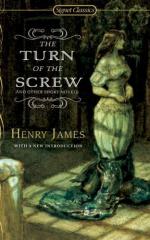|
This section contains 2,555 words (approx. 7 pages at 400 words per page) |

|
In the following essay, Chase discusses the idea of innocence in The Turn of the Screw.
Few critical theories about literary works have engendered as much controversy as Edmund Wilson's thesis in "The Ambiguity of Henry James" (1934) that in The Turn of the Screw "the ghosts are not real ghosts but hallucinations of the governess," who "is a neurotic case of sex repression" (Homage . . .). Wilson never abandoned his Freudian hypothesis, in spite of sharp rebuke from many Jamesian scholars. Dorothea Krook, for example, speaks of "his misguided Freudianism" and accuses him of "arriving at conclusions which are no longer even perverse but merely fatuous." And Krishna Vaid contends that he "makes a travesty of the text" and has even "violated . . . the larger context more flagrantly and more persistently than any adherent of his theory." Wilson's interpretation is like the proverbial horse that has "been much beaten but...
|
This section contains 2,555 words (approx. 7 pages at 400 words per page) |

|




